Latest News
23 February 2022
Signal discovered that connects cell size with cell growth
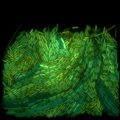
The mechanisms connecting growth with cell size have been mysterious – up till now: in a recent publication in Current Biology, researchers from TU Delft and AMOLF have uncovered that the signaling molecule ppGpp is essential to regulate cell size. Surprisingly, they also discover cells adjust their sizes to concentrations of ppGpp, rather than strictly according to growth rate.
07 February 2022
ERC Proof of Concept Grant for Arjen Jakobi
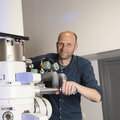
Arjen Jakobi (Department of Bionanoscience) receives the ERC Proof of Concept Grant for his groundbreaking research on cryogenic electron microscopy (cryo-EM). "This grant will allow us to take our new CryoChip technique for high resolution images of protein molecules to the next level for the development of new drugs," says Jakobi.
31 January 2022
The Boukany and the Koenderink groups have been awarded an EMW-M-2 grant (700 kEuro)
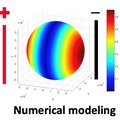
Genome editing technologies such as CRISPR-Cas systems are revolutionizing the life sciences because they make it possible to change or repair the genomes of cells with high precision. However, a major challenge that hampers widespread application is that genome editing requires getting molecular tools (nucleic acids and enzymes) into the cell, across the its insulating membrane.
11 January 2022
ERC Starting Grant for four TU Delft researchers
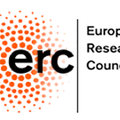
The European Research Council (ERC) has announced the ERC Starting Grants for young researchers. Four of them are scientists from TU Delft. This European grant of €1.5 million for a five-year programme is intended to enable individual scientists to build their own teams and conduct groundbreaking research.
04 November 2021
Scanning a single protein, one amino acid at a time
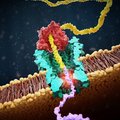
Using nanopore DNA sequencing technology, researchers from TU Delft and the University of Illinois have managed to scan a single protein: by slowly moving a linearized protein through a tiny nanopore, one amino acid at the time, the researchers were able to read off electric currents that relate to the information content of the protein. The researchers published their proof-of-concept in Science today. The new single-molecule peptide reader marks a breakthrough in protein identification, and opens the way towards single-molecule protein sequencing and cataloguing the proteins inside a single cell.
02 November 2021
Marileen Dogterom elected as KNAW president

We warmly congratulate professor Marileen Dogterom on her appointment as the president of the Royal Netherlands Academy of Arts and Sciences (KNAW), the forum, conscience, and voice of the arts and sciences in the Netherlands, effective June 1, 2022.
30 August 2021
Catch me if you can: a revolutionary method to study single proteins
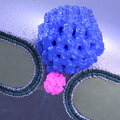
Researchers from the technical universities of Delft and Munich have invented a new type of molecular trap that can hold a single protein in place for hours to study its natural behavior – a million times longer than before.
30 June 2021
A new spin on making minimal cells
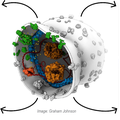
The ability of a cell to separate its own matter from its surroundings is a basic requirement for life. A team of researchers at AMOLF and Delft University of Technology have managed to create a synthetic container, or lipid vesicle, that is able to hold a range of different biological systems: from a cytoskeleton to entire E.coli bacteria. Their findings on this optimized cDICE method, which has the potential to reveal the inner workings of life, are published in ACS Synthetic Biology on DATE.
06 May 2021
Researchers discover how a cell’s armour can be both flexible and strong
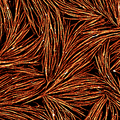
Medieval knights either had thick, cumbersome armour, or they could wear less protective armour and be flexible in combat – they couldn’t have both. Cells, on the other hand, do have it all. Researchers from Delft University of Technology (TU Delft), Leeds University, Institut Fresnel in Marseille, and Institut Curie in Paris discovered that proteins called ‘septins’ reinforce the fragile membrane of a cell, while still being flexible enough to allow the cell to change shape.
29 April 2021
Researchers create living material based on algae
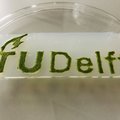
Researchers led by Delft University of Technology (TU Delft) used 3D printing to create a novel, environmentally-friendly and living material made of algae that has many potential applications.